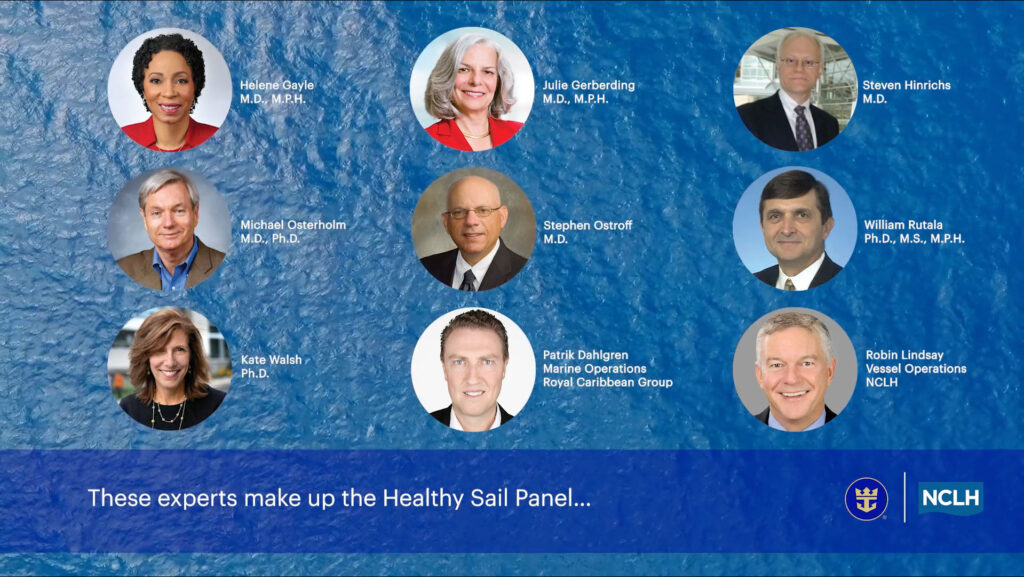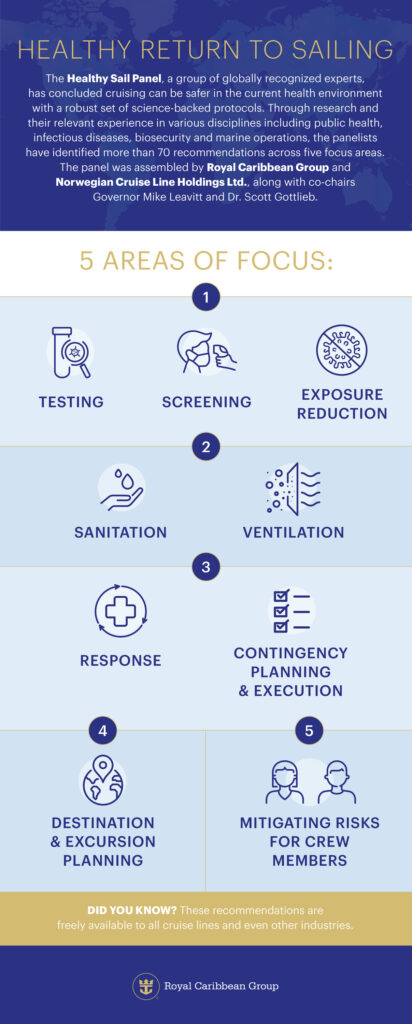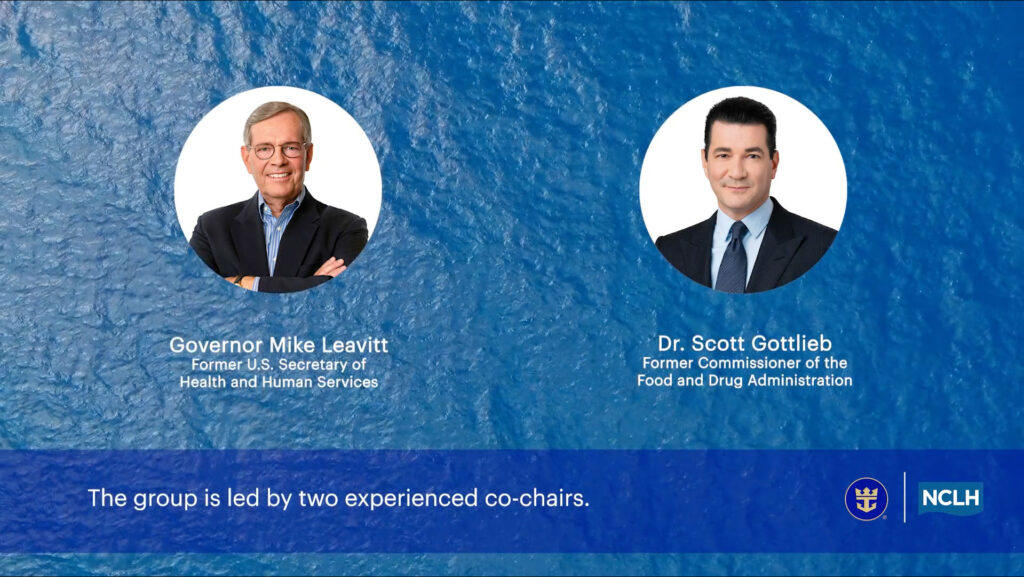Today, Royal Caribbean Group released an extensive report detailing the advice to cruise operators to advance their public health response to COVID-19, improve safety, and achieve readiness for the safe resumption of operations. The panel recommends 74 detailed steps to safeguard the health of guests, crew and communities. Disney Cruise Line was not a member of this panel, however, this information offers a detailed look at the potential changes guest may experience on their next cruise vacation. Additionally, the panel welcomes any cruise operator or industry to freely adopt the recommendations.

The Healthy Sail Panel submitted its recommendations on September 21st to the U.S. Centers for Disease Control and Prevention (CDC), in response to a CDC request for public comment that will be used to inform future public health guidance and preventative measures relating to travel on cruise ships. The Healthy Sail Panel was formed in June by Royal Caribbean Group and Norwegian Cruise Line Holdings Ltd. The Panel comprises globally recognized experts in medical practice and research, public health, infectious diseases, biosecurity, hospitality and maritime operations that have applied the best available public health, science and engineering insights to their recommendations.
The Healthy Sail Panel’s 65-plus-page report includes 74 detailed best practices to protect the public health and safety of guests, crew and the communities where cruise ships call. Recommendations include testing, the use of face coverings, and enhanced sanitation procedures on ships and in terminals. The Panel is chaired by Governor Mike Leavitt, former U.S. Secretary of Health and Human Services, and Dr. Scott Gottlieb, former commissioner of the U.S. Food and Drug Administration.
“The Healthy Sail Panel spent the last four months studying how to better protect the health and safety of guests and crew aboard cruise ships,” said Dr. Gottlieb. “Taken as a comprehensive approach, we believe the Panel’s robust public health recommendations will help inform strategies for a safe resumption of sailing.”
Gov. Leavitt said: “This Panel undertook an ambitious, cross-disciplinary, public health examination to develop standards and guidelines that create the highest level of safety in the complex environment of a cruise ship. We studied the industry’s experiences combating the pandemic – and we then incorporated the many lessons learned and advances made by medicine and science over the past six months. The Panel’s recommendations are grounded in the best scientific and medical information available and are intended to meaningfully mitigate public health risks to those who sail.”
“We understand our responsibility to act aggressively to protect the health and safety of our guests and crew, as well as the communities where we sail, and we asked the Panel to help us learn how to best live up to that responsibility,” said Richard D. Fain, chairman and CEO of Royal Caribbean Group. “We were inspired by the depth of the Panel’s work and their determination to help us establish the strongest protocols in the travel industry.”
“The Healthy Sail Panel’s recommendations are robust and comprehensive, and they reflect the intense focus the panelists brought to their work,” said Frank Del Rio, president and CEO of Norwegian Cruise Line Holdings Ltd. “We know that both authorities around the globe and consumers expect cruise lines to provide the safest, healthiest vacations we can, and this work demonstrates our commitment to doing just that.”
Fain and Del Rio said each company will use the Panel’s recommendations to inform the development of new, detailed operating protocols, which will be submitted to the CDC and other authorities around the globe for review and approval– an important milestone in the process of resuming sailing around the world. The Panel’s work is open sourced for others to incorporate in their protocols as well; Governor Leavitt and Dr. Gottlieb expressed appreciation that authorities and other cruise companies had already engaged in the Panel’s work as observers.
The Healthy Sail Panel identified five areas of focus every cruise operator should address to improve health and safety for guests and crew, and reduce the risk of infection and spread of COVID-19 on cruise ships:
- Testing, Screening and Exposure Reduction
- Sanitation and Ventilation
- Response, Contingency Planning and Execution
- Destination and Excursion Planning
- Mitigating Risks for Crew Members

In each category, the Healthy Sail Panel created practical and actionable recommendations to address specific safety concerns. Among the recommendations are key strategies such as:
- Taking aggressive measures to prevent SARS-CoV-2 from entering a ship through robust education, screening and testing of both crew and guests prior to embarkation
- Reducing transmission via air management strategies and enhanced sanitation practices
- Implementing detailed plans to address positive infection on board, including contingencies for onboard treatment, isolation and rapid evacuation and repatriation
- Closely controlling shore excursions
- Enhanced protection for crew members
The full Healthy Sail Panel report can be found here: Royal Caribbean Group or Norwegian Cruise Line Holdings Ltd.


The only recommendation I really have a problem with is testing component 1-5 days prior to sail. As we have seen here in Florida it may take more than 5 days to get your results. This also done not exclude the possibility of the individual being exposed after they took the test.
I won’t dive into the mask debate here but I believe the testing will be problematic.
And late Friday (I guess hoping people wouldn’t notice) the CDC finally acknowledged that the virus IS airborne and travels much farther than 6ft. If you are downwind from a person with a heavy virus load, you are at risk walking the decks outside. If you use a public toilet (the force of flushing aerosolizes the virus) after a person with a virus load, you are at risk. Until they re-engineer the filters on air handling systems to block the super tiny virus, you are at risk while breathing in your cabin. The closing of the economic loop (meaning eliminating all opportunities to spend money in ports independently of the cruise operator) will make it difficult for the ports to justify the cost of docking cruise ships (reference the decision of Key West). There is an economic DISincentive for guests to be honest about symptom reporting (and guests with symptoms aren’t really the problem, it’s the asymptotic people who are). Obviously each guest needs to make a risk assessment to determine their own comfort level with the possibility of becoming infected versus the benefit of vacation time. It is appropriate for Disney to put cruise operations at the end of the list of the empire re-start.
I know there are a great many details to be worked out, but the one thing that is foremost in my mind is too few elevators for the number of people that squeeze into them. If they restrict the number of people in the elevators, then that creates more people in the elevator lobby which causes a social distancing dilemma. From my point point of view this is additionally problematic as my wife is in a wheelchair. This also true of those on a mobility scooters, and those with baby strollers all trying to get in the elevator. I feel this just one of the many of the logistics that needs to be resolved